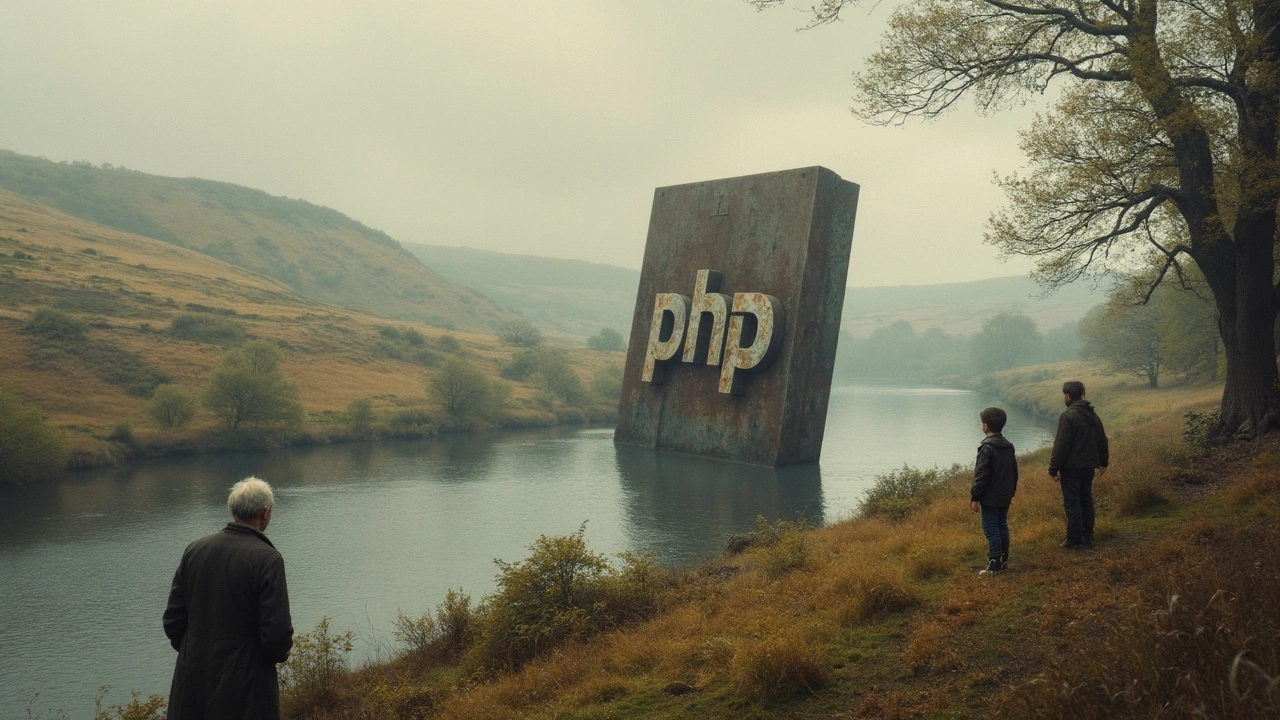PHP, once the darling of web development, is now facing some serious scrutiny. Back in the early days of the internet, it was the go-to for anyone wanting to build a website quickly. But here we are in 2025, and things have changed quite a bit.
What's the deal with PHP feeling so out of place? Well, for starters, the tech world never stops evolving. New languages and frameworks claim to be faster, more secure, and easier to use. PHP just hasn't kept up with that breakneck pace.
One reason is the rise of full-stack JavaScript frameworks like Node.js. They've taken the web development world by storm because they let you use one language on both the server and client sides. That's pretty appealing!
- The Rise and Stall of PHP
- Current Challenges for PHP
- Comparisons with Modern Alternatives
- The Role of PHP in Legacy Systems
- Future of PHP: Adapt or Fade Away?
The Rise and Stall of PHP
Back in the mid-90s, PHP burst onto the scene and changed web development forever. It was easy to learn and perfect for the dynamic pages that were all the rage at the time. Just about every budding developer was jumping on the PHP development bandwagon because it was open-source, had a great community, and got the job done efficiently.
From Boom to Stagnation
So, what went wrong? Well, as the internet matured, so did the tools we use to build it. Other languages started to appear with features PHP struggled to incorporate. These days, we're hearing more about modern alternatives like Python and JavaScript that bring new capabilities to the table.
One of the main reasons for PHP's waning appeal is its difficulty keeping up with web standards. Sure, PHP 7 brought amazing speed improvements, but it wasn't enough to lure back everyone who'd jumped ship. Developers wanted more than just speed; they sought modern practices that new languages were offering.
A Snapshot of PHP's Popularity
Despite PHP's slowdown, it's still everywhere—and by that, I mean nearly 80% of websites currently using a server-side language have PHP under the hood. But even with those numbers, the momentum is clearly shifting as new projects opt for something else.
In a world of sleek, shiny new tools, sticking with PHP sometimes feels like you're asking for a flip phone in a smartphone store. The language isn't irrelevant yet, but it sure has its work cut out for it if it wants to stay in the race for the next big thing in web development.
Current Challenges for PHP
Right now, PHP development is wrestling with several big challenges that make it feel somewhat outdated compared to its newer counterparts. It's not that PHP can't do the job anymore, but it's not always the first choice for developers diving into new projects.
The Performance Issue
Performance is a major sticking point. While PHP has made strides in recent versions, it's still often seen as slower than some of the newer alternatives. Developers looking at frameworks like Node.js are drawn to their speed and efficiency, especially for applications requiring real-time data processing.
Security Concerns
There's also the matter of security. While PHP gets regular updates to patch vulnerabilities, its past reputation for security holes lingers. Unlike robust systems built using Python and Ruby that boast frameworks specifically designed with security in mind, PHP sometimes feels like it’s playing catch-up in this department.
Modern Best Practices
Following modern development practices can be a challenge with PHP. Although it has frameworks like Laravel that encourage developers to adopt modern patterns, the language itself doesn't enforce it. This flexibility can lead to legacy code that lacks consistency and can be hard to maintain.
Community Perceptions
The community perception also plays a significant role. Many new developers jump straight to trends like JavaScript frameworks instead of dipping their toes into PHP. The stigma of PH tempered expectations, despite improvements, makes it a tough sell. Plus, there's the 'boring' label it sometimes gets stuck with—nobody wants to work with a language that doesn't excite them!
Database Integration
Integrated database support is another aspect where PHP doesn’t always shine. While it does have tools for connection, it lags behind in supporting modern databases compared to other languages that have smoother, more intuitive integration processes.
These challenges don't mean PHP's down for the count, but they are things to think about if you're considering it for a new project in 2025. Ultimately, choosing a language or framework comes down to the specific needs of the project and the team’s comfort with the tech stack.

Comparisons with Modern Alternatives
So, how does PHP stack up against the newer kids on the block? Let's break it down because there's a lot to consider when you're deciding on the right tool for web development.
Node.js vs PHP
PHP served as a cornerstone for web development, especially for CMS platforms like WordPress. But Node.js offers JavaScript enthusiasts a single language across the entire stack, server to client. It promotes cleaner code and potentially faster performance.
Node.js excels in handling I/O operations, which is great for real-time applications like chat and gaming servers. It's non-blocking and has a highly efficient event loop, making it a favorite for developers needing speed and scalability.
Python's Django and Flask vs PHP
Then there's Python with its powerful frameworks like Django and Flask. Django, in particular, is known for its "batteries-included" philosophy—it comes packed with features out of the box. As a result, many developers find it easier to build robust applications quickly.
Both Django and Flask have a more modern approach to web development, embracing newer coding practices and extensive libraries, which makes Python a popular choice in data-driven applications and beyond.
Ruby on Rails vs PHP
And let's not forget Ruby on Rails. Known for its "convention over configuration" approach, Rails lets developers dive straight into building functionality without delving into complex boilerplate code. Apps built with Rails can often be launched more quickly, which can be crucial in a fast-paced market.
Ruby on Rails also emphasizes developer happiness and sustainability, which can significantly boost productivity.
Popularity and Use Cases
PHP is still a juggernaut in powering large portions of the web, thanks to its historic use in platforms like WordPress, Joomla, and Drupal. However, newer projects often lean towards these alternatives for quicker development cycles, modern architecture designs, and better developer tools.
Here's a quick look at how these languages stack up in terms of usage:
| Language/Framework | Use Case | Performance |
|---|---|---|
| PHP | Content Management, Dynamic Websites | Moderate |
| Node.js | Real-time, Scalable Web Apps | High |
| Django/Flask | Data-driven Applications | High |
| Ruby on Rails | Rapid Prototyping | Moderate to High |
Each of these languages and frameworks has its strengths and weaknesses. Knowing what you need for your project is key. Whether it's the dominance of PHP in specific niches or the innovative flair of alternatives, the decision often boils down to your project's unique needs and your team's expertise.
The Role of PHP in Legacy Systems
Here’s the thing about PHP in legacy systems: it’s super important. Tons of older web applications and systems are built entirely or partially using PHP. It’s like that old reliable car in your garage that refuses to quit. Companies have invested a lot into these systems, and replacing them isn’t just about picking a new language or tool.
Let’s face it, shifting an entire company’s infrastructure to a new language can be super costly and time-consuming. Plus, there’s the risk of breaking stuff. This is why PHP development remains crucial, especially when it comes to maintaining and updating these older systems. You’ll still find PHP handling some serious jobs in the background, especially in financial systems, healthcare software, and older content management systems.
Why Do Companies Stick with PHP?
- Cost-Effectiveness: Rewriting a working system can burn through a lot of cash and resources.
- Risk Management: Changing the core components of a well-functioning system can introduce new bugs. Nobody wants new headaches if the old ones are manageable.
- Skill Availability: There’s still a decent pool of developers who understand PHP due to its long history.
So, while it might be seen as outdated, the truth is that legacy systems depend heavily on PHP. And for good reason! It still works and fits well for their current needs.
PHP Maintenance and Optimization
Maintaining these legacy systems doesn't mean just leaving them untouched. PHP developers continuously work on optimizing and ensuring these systems run smoothly. Updates, security patches, and minor enhancements are all part of the routine to keep things running efficiently.
Now, you might be wondering about the numbers. A study from 2024 reported that about 40% of legacy systems still rely on PHP development, primarily because it remains a reliable choice for many applications. Here's a quick look:
| Industry | Percentage Using PHP |
|---|---|
| Finance | 45% |
| Healthcare | 35% |
| Education | 55% |
This shows that while newer languages are making waves, PHP's role in existing infrastructure remains significant. Companies balancing new tech investments while keeping their old systems effective find themselves grateful for PHP.

Future of PHP: Adapt or Fade Away?
PHP's future really stands at a crossroads in 2025. It's been around since the mid-90s, and that's a long history in tech terms. But is it enough to carry it into the future of web development? The million-dollar question is whether PHP can adapt or if it's doomed to fade away.
For starters, let's talk about PHP's attempts to stay relevant. With the release of PHP 8 in late 2020, it introduced major performance improvements and new features like JIT compilation which boosted execution speed immensely. This was a much-needed move to keep PHP competitive, especially against languages like JavaScript and Python.
However, despite these updates, many developers feel PHP still has a way to go. Modern apps often require scaling and microservices, areas where PHP doesn't shine as bright. Web development trends continue shifting towards frameworks that handle these tasks more efficiently.
According to a survey by Stack Overflow, PHP is still used by almost 25% of professional developers, mostly due to its deep ties with WordPress and other content management systems. But when it comes to new projects, many devs prefer the agility and power of languages like JavaScript.
“PHP has its strength in simplicity and ease of usage for beginners. But to truly thrive, it needs to expand its vision beyond that,” says Dr. Laura Helm, a professor of computer science.
Legacy systems also play a part in this story. Many companies, especially older ones, have invested heavily in PHP-based systems. Switching these over to a new language would be time-consuming and costly. So, PHP remains valuable in maintaining and extending these existing systems.
Opportunities for Growth
Where PHP could find growth is by embracing modern practices. Some developers advocate for stronger frameworks and tools that can handle new technologies like cloud services efficiently. Another aspect could be community engagement, encouraging new developers to join the PHP ecosystem and bring fresh ideas.
- PHP needs to enhance its frameworks such as Laravel or Symfony to further simplify complex tasks.
- Strengthening its presence in emerging fields like cloud-native apps could be a game changer.
- Greater focus on security will help address one of PHP's historical weak spots.
Ultimately, PHP's future largely depends on the community and the direction taken by those leading its development. Will it adapt and innovate? Or will these challenges prove too much? Only time will tell, but PHP's story is far from concluded.
